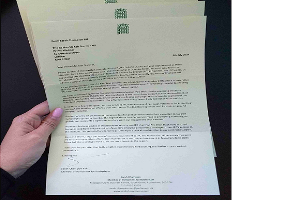Namibia has found itself at the centre of a political maelstrom following the circulation of yet another letter implicating the Independent Patriots for Change (IPC) in dubious financial dealings.
The letter, which has been widely disseminated across social media platforms, suggests a connection between the IPC and the UK Labour Party, raising critical questions about the party's funding sources and political affiliations.
Despite the photo of the letter making rounds online, the IPC has steadfastly maintained that it has no political ties either within Namibia or internationally.
This claim, however, is met with doubt due to the party leader Panduleni Itula's significant connections to the United Kingdom. Itula spent over 33 years in the UK before returning to Namibia in 2013.
These longstanding ties have fueled speculation about possible external influences on the party's activities and policies, particularly given the historical context of international political manoeuvring.
The party has faced mounting pressure to address these allegations, but its attempts to discredit the leaked letter have been largely unsuccessful.
The letter alleges that IPC vice-president Trevino Forbes and national chairperson Brian Black held meetings with British envoys, allegedly seeking financial backing for the party in the lead-up to the November election.
This revelation has only served to deepen public suspicion and distrust, painting a picture of a party potentially compromised by foreign interests.
Adding to the controversy, IPC president Panduleni Itula has made statements that many perceive as evasive rather than transparent.
Itula has insisted that his party will not disclose the identities of its supporters, citing transparency as the reason for this non-disclosure. However, critics argue that true transparency would involve revealing the sources of the party's financial support, especially in light of the serious accusations it faces.
Itula's stance has been interpreted by many as a refusal to engage with legitimate concerns about the party's integrity.
This issue of undisclosed funding has been a particularly contentious point. The party's failure to clarify the origins of funds used to acquire 101 white GWM bakkies for campaign purposes has further fueled allegations of secretive and possibly foreign funding.
These vehicles have been prominently displayed throughout the IPC's campaign efforts, becoming a symbol of the party's unresolved funding questions. The scale of this acquisition, and the associated costs, naturally leads to queries about the financial backers who are enabling such expenditures.
The situation was further complicated this week by comments from IPC party member Wilfred Muller, who is also the finance manager at the International University of Management (IUM). Muller claimed ownership of some of the campaign vehicles.
Notably, the IUM is widely recognized for receiving support from Western donors, which could suggest an additional layer of foreign influence within the IPC.
The potential conflict of interest and the blurring of lines between personal assets and party resources add another dimension to the controversy.
The combination of these factors—the leaked letter, the party's opaque stance on its supporters, and the questionable funding sources—has cast a shadow over the IPC's integrity and transparency.
The party's reluctance to address these issues head-on only amplifies public concern. As Namibia approaches the November elections, the electorate is left to grapple with these troubling revelations and the implications they may have for the country's political landscape.
The unfolding drama surrounding the IPC serves as a stark reminder of the critical importance of transparency and accountability in the political sphere, values that many Namibians fear may be compromised in this case.
The ongoing scrutiny and public discourse highlight a broader demand for honesty and openness from political entities, reflecting a society increasingly unwilling to accept opaque practices and potentially compromised leadership.
Opinions of Monday, 15 July 2024
Columnist: Séraphin Fouda
Controversy surrounds IPC and its shady funding amid new leaked letter
Entertainment














